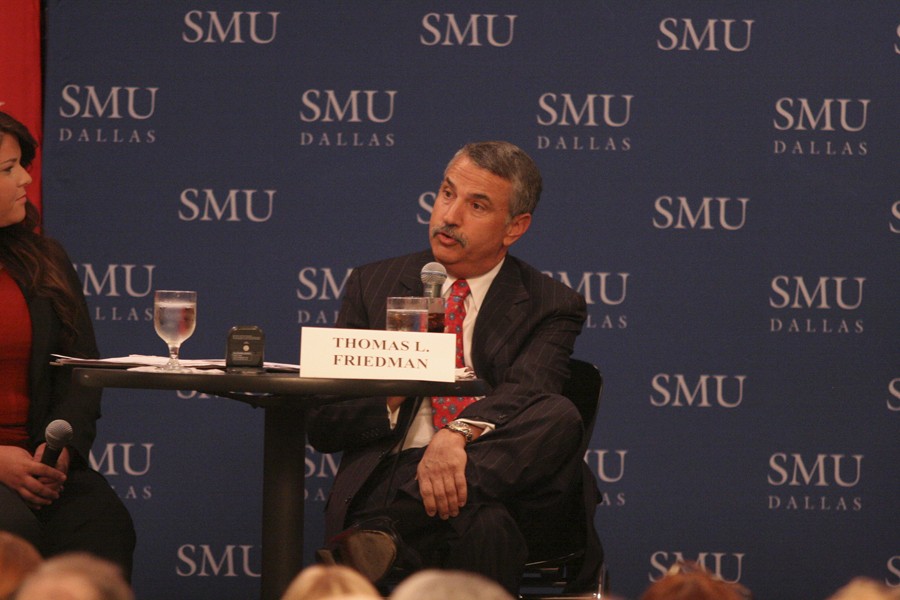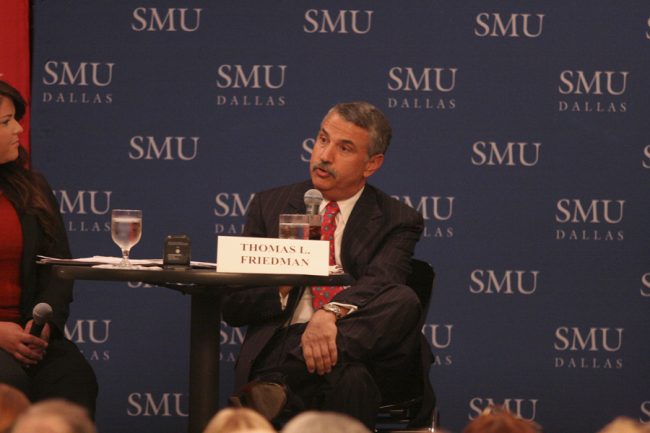
The New York Times foreign affairs columnist Thomas L. Friedman takes questions from SMU students during the first Turner Construction Student Forum of the year as a part of the Tate Lecture Series. CASEY LEE/The Daily Campus
SMU kicked off the 2009-10 Tate Lecture Series Linda and Mitch Hart Lecture with two distinct and world-renowned journalists from around the world.
In the 28th season of the Tate Lecture Series, Thomas L. Friedman, a New York Times foreign affairs columnist since 2005, spanned topics from Obama’s first summer performance in the White House to the health care debate and America’s progress in the war in Iraq.
Joining Friedman was Fareed Zakaria, the editor of Newsweek International since 2000, who stressed the importance of the United States evaluating its goals and measures of success in its efforts in rebuilding Afghanistan.
David Gergen, moderating the event for the 14th time in the lecture’s tenure, is currently a CNN senior political analysis and the editor-at-large of U.S. News and World Report.
In the first segment of the lecture, Gergen posed the question of how Obama has responded following the shrinking economy and health care debate, as well as how the education speech will be received by the public.
“I think part of it is, we’ve been through part of a complex series of events and as often happens, your success gets pocketed. I think [Obama] handled the economic crisis very well,” Zakaria said.
Friedman, in his third appearance at a Tate Lecture, agreed with Zakaria, saying Obama has been successful, but chose to focus more on Obama’s speech about education and health care than past performances and the economy.
“It’s sheer lunacy of debating if a president can talk to school children and tell them to study hard. At this time when we so need to take education seriously that we have a debate about those things is a shameful moment.”
Friedman, stressing the importance of today’s youth becoming actively involved in the growing climate and economic concern, feels our world is a ticking time bomb, but we remain unsure of what will set it off.
“Our kids are growing up in a world under the shadow of a climate bomb and a debt bomb where you never know it till it happens,” Friedman said. “You never know when the complexity of the climate system is going to produce some nonlinear event to happen.”
Friedman also posed the question of how we can pass our country onto the youth if only six of the world’s top thirty wind, solar and battery companies are in the United States?
Zakaria took a similar approach, commenting that while the rest of the world is surpassing us, the United States is remaining complacent in their efforts.
“We’ve got to step up our game,” Zakaria said. “Are we going to step up our game or worry about things that aren’t central to our issues?”
Zakaria expressed his greatest fear of the United States getting trapped in a circumstance “burdened by debt” while ignoring the issues that are creeping up on the country in post-America.
Transitioning into the issue of the Iraq war, Friedman and Zakaria, agree the United States is falling behind in moving forward, stuck in the past of setting goals that are unrealistic.
“They are all one war with different fronts and different fronts require different strategies,” Friedman said.
“If we are going to have a strategy that matches the sacrifice of the soldiers there, we need to level with the soldiers about what this is going to take and what this is going to cost.”









